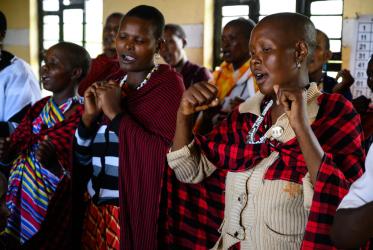Bantu groups settled the region several thousands of years ago. The Great Zimbabwe ruins attest to the existence of a powerful kingdom in the medieval era. In the 19th century the British established colonial control, in spite of Shona and Ndebele uprisings. Southern Rhodesia became a settlement of white farmers who resisted African majority rule when in 1964 neighbouring Zambia and Malawi became independent. The white farmers declared unilateral independence in 1965. After sixteeen years of war the African people of Zimbabwe recovered their independence in 1980. The WCC supported the liberation movements ZANU and ZAPU with grants from its Programme to Combat Racism Special Fund. Since the late 1990s President Mugabe's rule of the country has become increasingly authoritarian. Most of the white farms were nationalized, but redistribution has not benefited the poor African peasants. Elections have been rigged and the opposition harassed. The economy, based on agriculture and once one of the strongest of Africa, has seriously deteriorated. The churches have an important place in Zimbabwe's society. Many have supported the liberation struggle, and some were still backing the regime in 2005. The Zimbabwe Council of Churches, which is the ecumenical body, has on occasion spoken out against the abuses committed by the government, as has the Evangelical Fellowship of Zimbabwe, which is affiliated with the WEA. Some of the independent churches in Zimbabwe are very large, e.g. the Zimbabwe Assemblies of God Africa (Pentecostal) and the Zion churches (African Instituted).
Zimbabwe
Ecumenical Organizations and Councils
WCC member churches based in Zimbabwe
- Evangelical Lutheran Church in Zimbabwe
- Methodist Church in Zimbabwe
- Reformed Church in Zimbabwe
- United Church of Christ in Zimbabwe
WCC member churches present in Zimbabwe
- Church of the Province of Central Africa
- Greek Orthodox Patriarchate of Alexandria and All Africa
- Presbyterian Church of Africa
- United Congregational Church of Southern Africa
- United Methodist Church
- Uniting Presbyterian Church in Southern Africa
Note: The list of churches present in countries is still in development.
Last updated: 01/01/06
Ecumenical Organizations and Councils
WCC member churches based in Zimbabwe
WCC member churches present in Zimbabwe
Note: The list of churches present in countries/territories is still in development.





